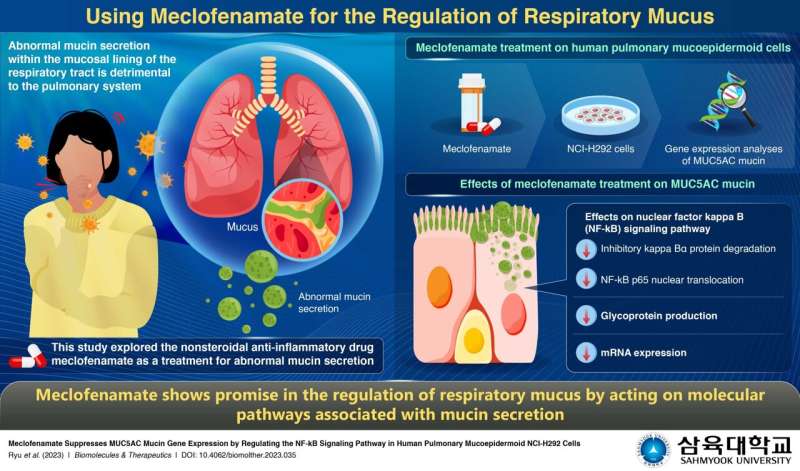This article has been reviewed according to Science X's editorial process and policies. Editors have highlighted the following attributes while ensuring the content's credibility:
fact-checked
proofread
Repurposing meclofenamate to treat abnormal respiratory mucus

Our respiratory systems are lined with a thin fluid layer called mucus on the inside. The mucus protects us from inhaling harmful and unwanted airborne agents from germs to pollutants; it achieves this feat due to its unique gel-like texture imparted by proteins called mucins.
By extension, over- or under-secretion of mucins can lead to abnormal respiratory mucus—a pathological manifestation in many respiratory diseases like chronic bronchitis, cystic fibrosis, and asthma, among others. Although multiple clinically approved drugs are available that can combat abnormal respiratory mucus, many of them cause unwanted and potentially serious side effects. This calls for an alternative solution to provide relief to patients having respiratory diseases.
In a recent study, a group of researchers from Korea repurposed an available drug called meclofenamate to understand its effects on the respiratory mucus. Meclofenamate had been traditionally used as a nonsteroidal anti-inflammatory drug for treating arthritis, parasitic infections, and prostate cancer, among other diseases.
The researchers have now found that meclofenamate can also treat abnormal respiratory mucus by controlling mucin secretion. Their study was published in Biomolecules & Therapeutics.
Speaking about the clinical potential of the results of the study, Dr. Hyun-Jae Lee, who is an associate professor at Smith Liberal Arts College and Department of Addiction Science, Graduate School, Sahmyook University, and one of the lead researchers, says, "Compared to conventional drug development strategies, our strategy of discovering new therapeutic effects from existing drugs saves a lot of time and costs."
In their study, the researchers tested the meclofenamate in a cell line called NCI-H292 that mimicked the respiratory cells, replete with the secretion of mucus with mucins. Specifically, they checked for the expression of a gene responsible for secreting a key mucin, MUC5AC. Further, they explored the molecular pathways involved in the action of meclofenamate on the mucin. Their findings hit the bull's eye, to say the least.
Their results suggested that meclofenamate markedly reduced the gene and, additionally, the protein expression of MUC5AC. The drug was found to achieve this by influencing a biomolecular pathway that is extensively involved in the immune response, namely the nuclear factor kappa light chain enhancer of activated B (or NF-kB) cell signaling pathway; it reduced the degradation of a biomolecular component called 'inhibitory kappa Bα' and the movement of another such component called 'p65' into the nucleus of the respiratory cells.
The gist of these findings is clear—meclofenamate is capable of controlling mucin secretion, and in turn, the characteristics of respiratory mucus. Meclofenamate has emerged as a novel therapeutic agent for abnormal respiratory mucus, with this study. These findings not only succeed in repurposing a readily available and clinically approved drug for a new disease condition, but also sets an example for ongoing efforts related to drug development and research.
"Discovering the unknown therapeutic effects of existing drugs against different diseases and related symptoms is more promising than de novo drug discovery and development. While the former requires only 3 to 12 years of intense research and investment of resources, the latter requires at least 10 to 17 years," concludes Dr. Lee. T
More information: Jiho Ryu et al, Meclofenamate Suppresses MUC5AC Mucin Gene Expression by Regulating the NF-kB Signaling Pathway in Human Pulmonary Mucoepidermoid NCI-H292 Cells, Biomolecules & Therapeutics (2023). DOI: 10.4062/biomolther.2023.035





















